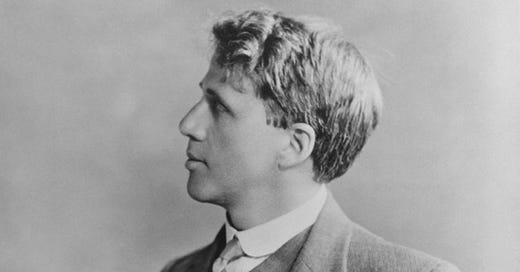I'm going out to clean the pasture spring; I'll only stop to rake the leaves away (And wait to watch the water clear, I may): I sha'n't be gone long.--You come too. I'm going out to fetch the little calf That's standing by the mother. It's so young, it totters when she licks it with her tongue. I sha'n't be gone long.--You come too.
Robert Frost is an interesting one. He’s not quite a part of the general public psyche, but never quite apart from it either. His quotable lines, like “The Road Not Taken”, are often misquoted. I’ve spoken to many folks who find his style and themes irrelevant and unrelatable.
I get it. I’ve never cleared a pasture spring. I’ve certainly never fetched a calf, little or otherwise. But that isn’t the goddamned point of this poem.
Frost uses two quatrains, each starting with three lines of iambic pentameter littered with assonance to create a singsong flow. He deliberately interrupts this flow with a tetrametric line that ends in the stressed-syllabic mess of “long.—you come too.”
Why the disruption? Because of love, of course. Frost explained this poem as being about “love that’s new in treatment and effect.” Love, in its intensity, disrupts our routines. It takes your structured life and injects some chaos into it. It might even make you miss a foot of meter. It might change your song. But you’ll take it, happily, and ask that person to accompany you on your mundane tasks.
Frost wrote about the human experience above all else. This poem is essentially Frost telling someone “I’ve got some shit to do, but I really like you and want to continue what we’ve got going on. Do you want to come along with me?” You may not relate to the rest, but I hope you can relate to that.






I love your analysis of this poem because it captures the magic (that is sometimes overlooked) of Frost as a narrative kind of poet. He loved blank verse, rhythmic meter, telling a story and captured realism in many of his works. As a modernist poet writing before the full swing confessional, free verse and at times political era of poetry of the 50s and 60s, I think he perfectly straddled the fence between traditional forms and purposes of poetry while still depicting a range of emotions and relatable situations that feel contemporary.
I got stuck on punctuation. The (parenthesis) in the first section, the semi colon and the fact that the first stanza is basically 1 sentence, except the "--You come too." part, which I would want to use a comma there. Then he's talking about an interesting thing he's noticed, like that's what he wants to share.
[I didn't mean for that part to rhyme, but now I am just leaving it]